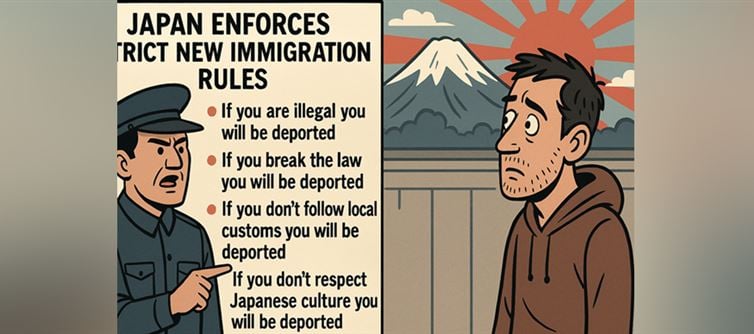
 Japan Didn’t ‘Tighten’ Immigration — It Just Did What Every Sensible Nation Should’ve Done Years Ago
Japan Didn’t ‘Tighten’ Immigration — It Just Did What Every Sensible Nation Should’ve Done Years Ago

japan just did what many nations talk about but never dare to do: draw a hard, unshakable line around its immigration rules. Clear expectations, zero ambiguity, full accountability. In a world where many Western governments tiptoe around enforcement, apologize for asking for order, and bend over backwards to avoid being “offensive,” japan doubled down on common sense.
No theatrics. No hashtags. No moral lectures.
Just: If you want to be here, you follow the rules.
A concept so simple—and yet in many countries, so politically radioactive—that saying it out loud can get you labelled, censored, or dragged through public shaming rituals.
Japan’s message is clear: A nation that cannot enforce its own rules won’t remain a nation for long.
1. Japan’s New Rulebook Isn’t Harsh — It’s Healthy
Enter legally.
Obey the law.
Respect local customs.
Don’t undermine the culture that hosts you.
Break these, and you go home.
Not controversial. Not “extreme.”
Just… functioning adult behavior.
japan isn’t reinventing anything. It’s simply refusing to outsource societal stability to wishful thinking.
2. The West, Meanwhile, Is Running on Fantasy Mode
While japan enforces expectations, many Western countries behave like borders are optional and accountability is offensive.
Question policies? You’re labelled.
Highlight real problems? You’re silenced.
In some places, even discussing social consequences lands you in legal trouble.
It’s a bizarre dynamic:
Citizens face scrutiny.
Newcomers face excuses.
No society can run on that imbalance without something eventually snapping.
3. Trust Doesn’t Grow in Chaos — It Grows in Clarity
Japan’s approach creates predictability:
Everyone knows the rules, the consequences, and the expectations.
This fosters social trust — the single most valuable currency in a stable society.
When nations remove boundaries, they don’t become “inclusive.”
They become confused.
Confused societies eventually become resentful ones.
4. Western Governments Keep Asking Citizens to “Adapt” — But Adapt to What?
Many governments allow uncontrolled or poorly vetted migration, then demand that citizens stay quiet about rising tensions, strain on services, and cultural frictions.
people are told to “be tolerant”…
…while being denied the right to talk about what’s actually happening around them.
That’s not harmony.
That’s gaslighting wrapped in policy.
5. Japan’s Model Doesn’t Target people — It Targets Behavior
The rules don’t discriminate.
They apply to everyone equally.
Follow the law? Welcome.
Break it? Goodbye.
Simple. Defensible. Fair.
Meanwhile, in many countries, identical actions yield different treatment depending on whether you’re a citizen or a newcomer.
That’s how trust dies.
6. Strong Borders Aren’t Hostile — Weak Borders Are
Clear expectations prevent resentment.
Resentment fills the space where clarity should have been.
The West keeps pretending the cost of disorder doesn’t exist.
Japan’s policy says:
It exists. It matters. And we won’t pay it.
7. At Some Point, Governments Must Protect Citizens — Or Citizens Will Start Protecting Themselves
When institutions fail to enforce fairness, people begin to enforce it informally.
History has proven this repeatedly.
Japan is choosing prevention.
Many Western nations are choosing denial.
Denial always ends badly.
⚔️ FINAL WORD
A country isn’t extreme for defending its identity.
It’s extreme to expect citizens to stay silent while their leaders refuse to enforce basic order.
Japan’s message to the world is simple:
Strong borders. Clear expectations. Equal accountability.
That’s not nationalism — that’s sanity.



 click and follow Indiaherald WhatsApp channel
click and follow Indiaherald WhatsApp channel